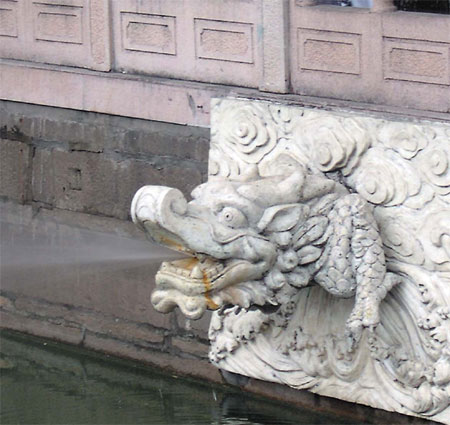In 2006, two community leaders in Zhenbeizhuang village, Henan province, led an expedition deep into Songshan Mountain. After 19 attempts, they finally struck water - offering a way to ease the thirst of not just a parched land but also a generation of bachelors.
For decades, dozens of men in Zhenbeizhuang had been unable to find wives as the village did not have enough water.
"I can pen a beautiful verse, I am able to sing opera, I'm healthy and not bad looking. But as there was no water in my village, no one wanted to marry me," Kang Fupeng, 51, told local media late last year.
Then last December, an aqueduct being built to channel water from the Songshan spring broke the halfway mark. It was also the time for local village elections and unsurprisingly, the two water expedition leaders were elected.
|

|
|
According to Chinese legend, all water bodies are ruled by the dragon, and this may also explain why the Chinese word for tap is shuilongtou or, literally, water dragon head. [China Daily] |
"This time, we really have hope," the villagers were reported as saying.
Zhenbeizhuang's experience is one example of how the power of water impacts every aspect of life in one of the world's oldest civilizations.
Control of this precious source is readily reflected in a saying many Chinese know well - Yin Ma Huang He, or "Water the Horses at the Yellow River" - which meant controlling the central regions through the major waterway.
According to Chinese legend, it is also the powerful dragon that holds sway over water bodies, rain, rivers and oceans. The seas are believed to be controlled by the four dragon kings and people often offered sacrifices to the dragon in times of flood or drought.
In Sichuan province, the Dujiangyan Irrigation Project built in 256 BC during the Warring States Period still stands and irrigates more than 5,300 sq km in the region.
The project is held up as one of mankind's engineering marvels for its diversion of waters in the Minjiang River to tame floods and feed farmland. Li Bing, the man behind Dujiangyan, became a god to the locals.
Similarly, Chinese culture is steeped in the ancient system of aesthetics known as feng shui or "wind-water". From the layout of imperial capitals to that of the family grave, the location and flow of water forms a focal point for many Chinese who seek harmony with the universe and control over their destiny. Moviegoers even saw in the recent epic Red Cliff (Part 2) how legendary military strategist Zhuge Liang understood the movements and convergence of water and wind. This uncanny ability allowed him to forecast the weather and gain an upper hand over enemies in the Three Kingdoms period - and a revered place in Chinese history.
For a country that feeds the world's largest population in one of the most geographically expansive regions, the provision of water remains at the top of the agenda more than ever today.
Already, there are plans to speed up construction of the South-to-North Water Diversion Project, a mammoth undertaking designed to divert water from the water-rich southern regions and the Yangtze River, the country's longest river, to the arid north. By 2050, the $70-billion endeavor is poised to help 300 million people in a dozen provinces, municipalities and autonomous regions lacking adequate water supplies.
The move could not have come at a more crucial time - the country continues to suffer from a drought that has parched cropland in major wheat-producing areas, caused water shortages for more than 4 million people and forced the use of rain-making rockets blasted into the skies for temporary relief to farmers and residents.
As China remains a large part of a global effort to deal with increasingly scarce water supplies, the words of Confucius continue to ring true - Zhi ze le shui, ren zhe le shan (the wise man delights in water, the good man delights in mountains) - and the key to paradise on earth remains in this life-giving resource.
(China Daily February 19, 2009)